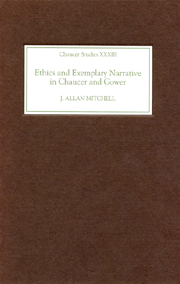Book contents
- Frontmatter
- Contents
- Acknowledgements
- Abbreviations
- Introduction
- 1 Reading for the Moral: Controversies and Trajectories
- 2 Rhetorical Reason: Cases, Conscience, and Circumstances
- 3 Gower For Example: Confessio Amantis and the Measure of the Case
- 4 All That Is Written For Our Doctrine: Proof, Remembrance, Conscience
- 5 Moral Chaucer: Ethics of Exemplarity in the Canterbury Tales
- 6 Pointing the Moral: The Friar, Summoner, and Pardoner's Satire
- 7 Griselda and the Question of Ethical Monstrosity
- Conclusion
- Bibliography
- Index
- CHAUCER STUDIES
1 - Reading for the Moral: Controversies and Trajectories
Published online by Cambridge University Press: 12 September 2012
- Frontmatter
- Contents
- Acknowledgements
- Abbreviations
- Introduction
- 1 Reading for the Moral: Controversies and Trajectories
- 2 Rhetorical Reason: Cases, Conscience, and Circumstances
- 3 Gower For Example: Confessio Amantis and the Measure of the Case
- 4 All That Is Written For Our Doctrine: Proof, Remembrance, Conscience
- 5 Moral Chaucer: Ethics of Exemplarity in the Canterbury Tales
- 6 Pointing the Moral: The Friar, Summoner, and Pardoner's Satire
- 7 Griselda and the Question of Ethical Monstrosity
- Conclusion
- Bibliography
- Index
- CHAUCER STUDIES
Summary
The learned judge correctly that people of all ages have believed they know what is good and evil, praise- and blameworthy. But it is a prejudice of the learned that we now know better than any other age.
My characterization of the ethical potentialities of exemplary rhetoric admittedly flies in the face of a commonplace critical presumption about the teleology of morals and the authoritarian nature of didactic literature. A composite sketch of the teleological account might take the following form: morality took an unfortunate turn in the Middle Ages when it assimilated itself to Church-dominated dogmatism, until moral rationalism found its feet again in the autonomous ethics of Enlightenment reason and Reformist spirituality. The assumption is that modern philosophy forever made ethics personal and appealingly complex again; and so in the vicissitudes of history, medieval morality stands out for its inflexibility, severity, or naive simplicity.
The plotline of this grandest of narratives is discernable in the work of Michel Foucault, in whose view the move from Hellenic to Christian morality is analyzed as one of a post-lapsarian descent into “a very strong ‘juridification’ – more precisely, a very strong ‘codification’ – of the moral experience.” Prior to medieval times, so Foucault argues, the pagan morality of the Greeks constituted an “art of life.”
- Type
- Chapter
- Information
- Ethics and Exemplary Narrative in Chaucer and Gower , pp. 8 - 21Publisher: Boydell & BrewerPrint publication year: 2004



